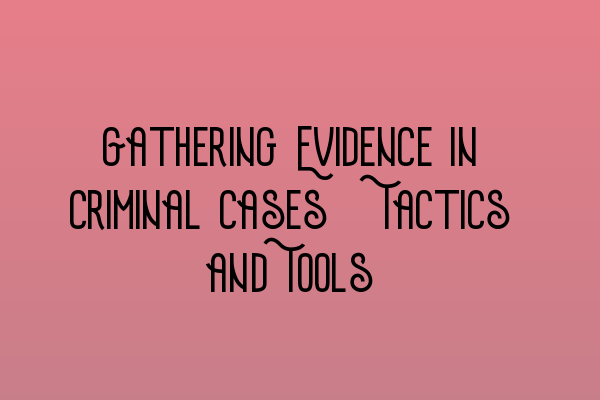Gathering Evidence in Criminal Cases: Tactics and Tools
Welcome to the SQE Criminal Law & Practice Law UK blog! In today’s post, we will discuss the tactics and tools involved in gathering evidence in criminal cases. As criminal law solicitors, it is crucial for us to understand the various methods and resources available to compile a strong case for our clients.
The Importance of Gathering Evidence
In any criminal case, the quality and quantity of evidence can make or break the outcome. As solicitors, our role is to collect evidence that supports our client’s innocence or proves their guilt beyond a reasonable doubt. Effective evidence gathering can strengthen our legal arguments and help us achieve the desired outcome for our clients.
When gathering evidence, it is essential to consider both direct and circumstantial evidence. Direct evidence includes eyewitness testimonies, video recordings, photographs, or any other evidence that directly links the accused with the crime. Circumstantial evidence, on the other hand, may indirectly establish guilt or innocence based on logical reasoning and inference.
Tactics for Effective Evidence Gathering
1. Witness Interviews: Conducting thorough interviews with witnesses can provide valuable insights and perspectives on the case. These interviews should be conducted in a structured and unbiased manner to gather accurate and admissible information. It is essential to listen actively, ask relevant questions, and document the witness statements accurately.
2. Forensic Analysis: Utilizing forensic techniques and experts can unveil critical evidence that may not be visible to the naked eye. Forensic analysis includes DNA testing, fingerprint analysis, ballistics, and other scientific methods. This evidence is often highly reliable and persuasive in court.
3. Document Examination: Scrutinizing documents such as contracts, financial records, or medical reports can reveal inconsistencies or discrepancies that can be used to build a case. Document experts can help identify forged signatures, altered documents, or any other form of fraud.
4. Surveillance and Digital Evidence: In today’s digital age, surveillance footage, phone records, social media posts, and other electronic evidence can play a crucial role in criminal cases. It is important to leverage technology and work with experts to retrieve, preserve, and present this evidence effectively in court.
Tools for Evidence Compilation
As solicitors, we have access to various tools and resources that facilitate evidence gathering. These include:
– Legal Databases and Libraries: Online legal databases provide access to case law, legal precedents, statutes, and other legal resources that can support our arguments and help us build a strong case. It is crucial to stay up-to-date with recent legal developments and utilize these databases effectively.
– Digital Forensic Software: Specialized software tools enable us to extract and analyze data from devices, recover deleted files, and uncover digital evidence. These tools can be instrumental in cases involving cybercrimes, computer fraud, or digital communications.
– Expert Witnesses: When complex scientific or technical evidence needs to be presented in court, expert witnesses can provide their knowledge and expertise to explain the evidence to the judge and jury. These witnesses play a significant role in establishing credibility and strengthening the evidentiary value of the case.
Enhance Your Legal Skills with SQE Courses
To excel in the field of criminal law and practice, it is vital to continuously update and enhance your legal skills. SQE Criminal Law & Practice Law UK offers a range of comprehensive SQE 1 and SQE 2 preparation courses to help aspiring solicitors succeed in their careers.
If you are preparing for the SQE 1 exams, consider taking advantage of our SQE 1 Practice Exam Questions and SQE 1 Practice Mocks FLK1 FLK2. These resources will help you assess your knowledge and identify areas for improvement.
For SQE 2 exam preparation, we offer comprehensive courses designed to equip you with the necessary skills and knowledge required to excel in criminal law. Explore our SQE 2 Preparation Courses to take your legal career to new heights.
Stay Updated with SQE Exam Dates
Stay informed about the upcoming SQE exam dates to ensure you plan your studies and preparation effectively. Visit our website for the latest SRA SQE Exam Dates and mark your calendars accordingly.
Thank you for reading our blog post on gathering evidence in criminal cases. Effective evidence gathering is a fundamental skill for any criminal law solicitor. Stay tuned for more informative content from SQE Criminal Law & Practice Law UK!
